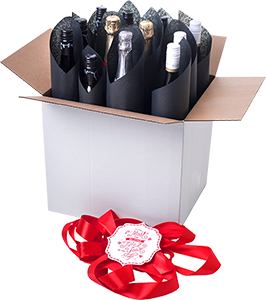Mixing Grape and Grain in Marlborough
Becoming a Cicerone is a lot of work, but Josh Scott is up to the challenge. Josh Scott talks beer snobs, supermarket wine, and reaching “peak hop”.
By Don Kavanagh – wine-searcher.com
If you need something done, ask a busy person, they say. If that’s the case, feel free to pass on any important tasks to New Zealander Josh Scott.
The son of well-known Marlborough wine figure Allan Scott, Josh not only looks after the winemaking for the family winery but he is also the founder and brewer of Moa Beers, one of the biggest craft breweries in New Zealand.
He is also one of 200 Certified Cicerones around the world, a beer qualification similar to wine and sommelier education courses. Add in a couple of kids and a fondness for multisport events and it’s a wonder he has any time at all to stop and chat to Wine-Searcher.
He is happy to talk, of course. Moa has just released its latest beer, a Belgian-style IPA in the company’s Festive series, and Scott is keen to talk up the brewing side of his life.
Founded in his father’s winery in 2003, Moa hasn’t always had the easiest of rides. A public float was followed by a dismal share-price drop and the company has also attracted criticism from craft beer aficionados who don’t think it is ideologically pure enough.
Scott, however, is bullish.
“Sales are phenomenal; we’re exporting to the U.S., U.K., Australia and Asia, and Brazil really likes our beer, too. I think we worked out that, every five seconds, someone around the world is drinking a Moa beer. We’re easily the fourth-biggest brewery in New Zealand, we brew a million liters of our special reserve beers and then there is the core range as well.”
He admitted that the company had learned some valuable lessons from the aftermath of its public float, but said it was something they were getting over. The more snobby end of the craft beer spectrum’s disdain for his beers – seemingly based on the perception that a successful brewer is somehow suspect – is something you feel hurts him more than any financial blow.
Moa is one of New Zealand’s largest craft brewers, but has taken some heat.
“Are we pioneers? I think so. When I was selling my first beers 12 years ago, there were no craft beers on the supermarket shelves, now there are plenty. We were there before there were craft beer nerds! We’ve had some criticism and I think it has been unjustified – size has nothing to do with craft beer. If you go to the U.S. there are breweries there that make huge quantities of beer, but they are still considered craft beers. The craft beer snobs remind of the wine snobs of a few years ago – over-pretentious people who thought they knew best. Wine snobs had suits, craft beer snobs have beards. I’m a bit of a beer nerd myself, but I think I’m allowed to be.”
Some of the suspicion of Moa could also be down to the more sensible approach to the use of hops that Scott and fellow brewer David Nicholls have taken. The Hop-ocalypse approach of cramming in as many IBUs as possible is not for them.
“In the US, it’s just nuts; it’s like an arms race with people trying to pack in more and more hop flavors. I can’t believe how hoppy beer has become in the past five years, but balance is the key – the hop hit is fine, but you need some malt and alcohol to back it up. You can’t make a lower-alcohol beer, for example, and pack in so much hop flavor; the beer just won’t support it. I hope we do reach peak hop soon, though, because it’s getting a bit silly.”
The brewing game is close to his heart, naturally, but the winemaking is genetic. His father started the winery and Scott Jr and his two sisters were involved early. Scott started making his own wine aged 12 and was trying to market his own label at the age of 15.
“Winemaking and brewing are about 50/50 at the moment. There’s been a bit of a generational change at the winery with Mum and Dad moving out. It’s busy at the winery; we’re trying to strip things back to a pure quality focus. I know everyone says that, but it’s true. I’m sick of seeing our wines on the supermarket shelf for $15, I know they are better than that.
“You get fly-by-night supermarket brands, based outside of Marlborough, buying grapes cheap and cranking out a Sauvignon Blanc for the supermarkets. Two vintages later the brand has disappeared. That forces down everyone’s prices and there’s just no margin in it for the winery. After all a winery is a business and needs that margin to survive.”
As the old saw goes, the best way to make a small fortune out of wine is to start off with a very large fortune.
Scott is trying to reestablish a quality focus for Allan Scott Wines.
“It’s not a very profitable endeavor, to be honest, but it’s a bit like in France – it’s a lifestyle thing, tending the vines, picking grapes, making wine. Land prices in Marlborough have gone off the chart. There’s not much land left to convert to vineyard down here, so prices are going crazy. It might help in the long run, by weeding out some of the fly-by-night operators.”
So not content with making beer and making wine and all the other things he does in his busy life, he decided a couple of years back to complicate his life still further by entering the Cicerone program. Even worse, it meant he had to drink beer as part of his research.
“The Cicerone is quite a challenge. You need to know the history of beer, the different styles, you need to know about food matching, beer systems, everything about beer. I heard about the program and thought I’d give it a try. It’s been heaps of fun – I got to try thousands of different beers as research – and it’s given me a bit more credibility in the beer world.
“There are three levels, so the next stage for me is the Master Cicerone, which is like the Master of Wine for beer. You need an encyclopedic knowledge of beer and you face a two-day theory and practical exam. I would like to do the MW myself, but I need to nail this first.”
Holding the MW and MC qualifications would put him in a pretty singular group, but he has always been about combining his two major pursuits.
“We’ve experimented with a hopped Sauvignon Blanc and a Pinot Noir with chocolate and coffee flavors; we’re always looking to innovate and everyone is quite excited about it. We’re experimenting with aging our methode underwater and at altitude up on top of a mountain. I’ve been taking a leaf out of the brewing book and trying different things out in the winery.”





